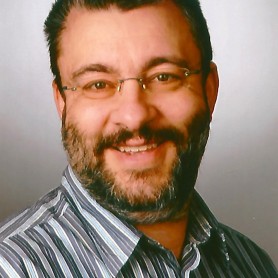Dr. Stefan Ritt
Paul Scherrer Institute
Lectures
Know your Signals: Waveform Digitizing in the Giga-sample Range with Switched Capacitor Arrays
Fast waveform digitizing is traditionally done with flash ADCs. These devices however hit their limits in resolution and power consumption when it comes to sampling rates far beyond the Giga-sample per second range (GSPS). An alternative for non-periodic signals are Switched Capacitor Arrays (SCA) that store an analog waveform in a series of capacitors, which are then digitized after a trigger at much lower speed. While these chips have been used for two decades in particle physics, the recent improvements in CMOS technology allows for designs with resolutions of 12 bits, sampling speeds beyond 10 GSPS and power consumptions of a few tens of mW per channel. Putting many channels on a single chip makes it possible to build data acquisition systems with several thousand channels at reasonable costs, space and power requirements. Obtaining the waveforms of particle detectors at high resolution allows excellent timing measurements down to a few pico-seconds, doing particle discrimination and efficient pile-up rejection.
This lecture covers the basic principles of SCAs, gives an overview of currently available chips and introduces advanced waveform processing techniques used in particle physics and gamma-ray astronomy. Experiences from the MEG experiment with 3000 SCA channels are reported. It finishes with an outlook for new chips currently under design and how they can be used in future experiments.
Real-time data visualization and control using modern Web technologies
This lecture teaches modern web technologies for real time visualization and control of processes and experiments. It starts from basic HTML elements, and then covers modern HTML5 technologies and their usage to display any graphical data. An embedded web server on a Raspberry Pi computer is written from scratch, which can be controlled from any browser using the above technologies to read sensors and switch outputs. Basic knowledge of HTML and C/C++ is helpful but not required.
About

Dr. Stefan Ritt is the head of the muon physics group at the Paul Scherrer Institute in Switzerland. He got his Ph.D. in particle physics from the University of Karlsruhe, Germany, in 1993. He was responsible for the design, commissioning and data taking of the PIBETA and the MEG experiments at PSI, both being medium-sized particle physics experiments searching for new physics beyond the Standard Model. In the framework of these experiments he wrote several software packages such as the ELOG electronic logbook and the MIDAS data acquisition system. On the hardware side he designed the MSCB slow control system and the DRS series of chips, which are used in many experiments today for waveform digitizing in the Giga-sample range. This switched capacitor arrays outperform traditional ADCs in many ways and allows the building of DAQ systems with thousands of channels at reasonable costs. He served as Associate Editor of the Transactions on Nuclear Science, is chair of the NPSS technical committee on Computer Applications in Nuclear and Plasma Science, and has been involved in the organization of the Real Time Conference since 2003.